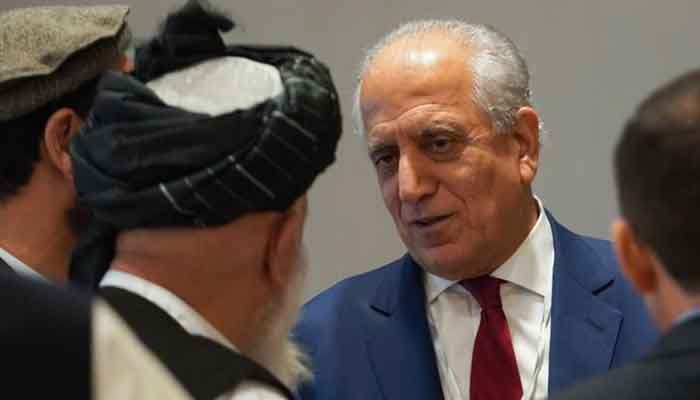Was Khalilzad kept unaware by Trump about calling off peace talks?
According to well-informed sources, Khalilzad had left Doha, Qatar, for Vienna, Austria, after concluding peace talks with the Taliban deputy leader Mullah Abdul Ghani Baradar. He got the news about Trump’s tweets calling off the peace talks in Vienna.
PESHAWAR: It seems even Zalmay Khalilzad, the chief US negotiator holding peace talks with the Taliban in Qatar since September 2018, wasn’t aware that President Donald Trump was planning to call-off the peace negotiations.
According to well-informed sources, Khalilzad had left Doha, Qatar, for Vienna, Austria, after concluding peace talks with the Taliban deputy leader Mullah Abdul Ghani Baradar. He got the news about Trump’s tweets calling off the peace talks in Vienna. He was en route to Brussels, the capital of Belgium, where he was scheduled to brief the defence ministers and other officials of Nato member countries about the draft peace agreement finalized with Taliban after months of painstaking negotiations.
Related: Pakistan urges US, Taliban to re-engage in peace talks
The sources said the Nato secretary general was expected to make a statement supporting the peace agreement after the briefing by Khalilzad, who had been keeping the Nato authorities updated about the peace process during his regular visits to Brussels. The Afghan-born Khalilzad, who has served in the past as the US ambassador for Afghanistan, Iraq and the UN, was reportedly caught by surprise.
He is said to have changed his travel plans and headed for Washington to find out more about the reasons for Trump’s unexpected decision. His point of call would as usual be the State Department and Secretary of State Mike Pompeo, his immediate boss.
Khalilzad was appointed as the US special envoy for Afghanistan Reconciliation in September last year to negotiate with the Taliban for achieving peace in Afghanistan. Earlier, senior State Department official Alice Wells had opened negotiations with the Qatar-based Taliban Political Commission in July 2018.
Khalilzad had throughout the peace talks presented an upbeat and optimistic view of the process despite the fact that the negotiations were difficult and tiring. He kept the world informed through his tweets as he travelled between Washington and Doha and made frequent trips to Kabul, Islamabad and other world capitals to consult the important stakeholders about the peace process.
It isn’t clear whether Khalilzad would resign from his position or would be asked to stay until the situation became clear. If he stays in his position, it would be an indication that the peace talks with the Taliban could be revived in future.
-
 Arden Cho Shares Update On Search For ‘perfect’ Wedding Dress Ahead Of Italy Ceremony
Arden Cho Shares Update On Search For ‘perfect’ Wedding Dress Ahead Of Italy Ceremony -
 Ariana Madix Goes Unfiltered About Dating Life
Ariana Madix Goes Unfiltered About Dating Life -
 Prince William Closes Saudi Arabia Visit With Rare Desert Shot
Prince William Closes Saudi Arabia Visit With Rare Desert Shot -
 'King Charles Acts Fast Or Existential Crisis' Over Andrew Scandal
'King Charles Acts Fast Or Existential Crisis' Over Andrew Scandal -
 Brooklyn Beckham Charging Nearly £300 In Ticket Cost For Burger Festival
Brooklyn Beckham Charging Nearly £300 In Ticket Cost For Burger Festival -
 Prince William Makes Unexpected Stop At Local Market In Saudi Arabia
Prince William Makes Unexpected Stop At Local Market In Saudi Arabia -
 Zayn Malik Shares Important Update About His Love Life
Zayn Malik Shares Important Update About His Love Life -
 Kate Middleton, William Are Holding Onto Their Hats As Worse Gets Threatened: Behind The Veil Of Shame
Kate Middleton, William Are Holding Onto Their Hats As Worse Gets Threatened: Behind The Veil Of Shame -
 British Soap Awards Scrapped Again As ITV Confirms 2026 Hiatus
British Soap Awards Scrapped Again As ITV Confirms 2026 Hiatus -
 Climate Nearing Dangerous Tipping Points, Study Shows
Climate Nearing Dangerous Tipping Points, Study Shows -
 James Van Der Beek, 'Dawson's Creek' Star, Dies At 48
James Van Der Beek, 'Dawson's Creek' Star, Dies At 48 -
 Threads Launches Dear Algo AI Feature To Personalise Feeds In Real Time
Threads Launches Dear Algo AI Feature To Personalise Feeds In Real Time -
 Police Take Action Over Andrew's Ties With Jeffrey Epstein While In UK Office
Police Take Action Over Andrew's Ties With Jeffrey Epstein While In UK Office -
 Courtney Love Makes First Appearance Since New Report On Kurt Cobain's Death
Courtney Love Makes First Appearance Since New Report On Kurt Cobain's Death -
 King Charles Anxious As Uncertainty Grows Over Sarah Ferguson’s Next Move
King Charles Anxious As Uncertainty Grows Over Sarah Ferguson’s Next Move -
 Real Reason Kim Kardashian Is Dating Lewis Hamilton
Real Reason Kim Kardashian Is Dating Lewis Hamilton




